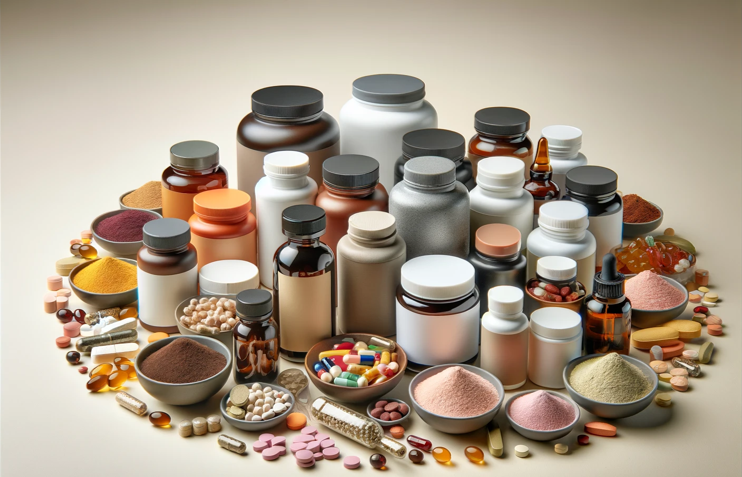Number one: Magnesium
Magnesium supplements may be necessary for individuals with low dietary intake to avoid deficiency symptoms like muscle cramps and heart issues. Around 75% of US citizens aren’t getting enough magnesium through their food. This mineral supports bone health by aiding the function of cells that form and remodel bones and helps regulate other minerals crucial for bone structure. Additionally, maintaining proper magnesium levels can reduce the risk of heart disease by supporting regular heart rhythms and healthy blood pressure. It also plays a role in blood sugar control, potentially improving insulin sensitivity. Furthermore, adequate magnesium is important for mental well-being, as deficiencies are linked to a higher risk of depression, and it contributes to muscle relaxation and improved sleep.
Number two: Creatine
Creatine, a well-researched supplement, enhances muscle performance and recovery without the previously suspected health risks. It’s been shown to have no connection to hair loss, uric acid levels, kidney damage, dehydration, or muscle cramps. Instead, it boosts lean muscle, not fat. Creatine also improves brain function and memory, particularly under stress or aging, by increasing brain creatine levels. Studies suggest a daily intake of 3-5 grams can benefit cognitive and muscle health, especially in older adults.
Number three: Protein powder
Maintaining muscle strength throughout life is key to longevity, with higher strength linked to lower mortality rates. Therefore, it’s advised to build muscle strength early on, sustain it through middle age, and slow its decline in later years. Clinical guidelines recommend a protein intake of 1.6 grams per kilogram of body weight daily to offset muscle loss, with older adults needing even more—around 2 grams per kilogram—due to less efficient protein absorption. For an 80 kg individual, this means 160 grams of protein daily, equivalent to over half a kilogram of beef. Contrary to some beliefs influenced by mouse studies that suggest a low protein diet extends lifespan, human studies, like one in the British Medical Journal in 2020, show that higher protein intake correlates with lower mortality. Protein powders can be an effective supplement to meet these dietary goals and support muscle performance.
Number four: TMG or trimethyl glycine
TMG (trimethylglycine) may boost adenosine triphosphate recycling and protein synthesis in muscles, with mixed research findings. A 2017 meta-analysis of seven studies found that TMG’s strength or power benefits were only evident in two studies where it was combined with exercise, suggesting exercise is necessary to reap TMG’s benefits. A 2021 study on professional soccer players showed TMG improved endurance and sprint performance. Beyond muscle benefits, TMG could play a role in reducing Alzheimer’s disease risk by lowering homosysteine levels, a promising intervention according to a 2020 analysis. While conclusive evidence is still needed on TMG’s impact on dementia rates, it presents an additional reason to consider TMG supplementation, typically recommended at 500 mg to 1 g daily, for brain health.
Number five: Omega-3
Observational studies have indicated that fish consumption is associated with a slower rate of cognitive decline compared to non-fish eaters, sparking interest in Omega-3 supplements as a potential solution to reduce cognitive decline. However, results from randomized control trials have not supported this, showing that Omega-3 supplements do not provide cognitive benefits and do not benefit those with mild to moderate Alzheimer’s disease. On the other hand, a significant study known as the VITAL trial revealed a surprising 28% decrease in heart attack risk among Omega-3 users, and a Mayo Clinic meta-analysis of clinical studies confirmed a significant reduction in heart attack risk with high confidence. Taking 1 to 2 Omega-3 capsules daily could be beneficial for heart health
Number six: Psyllium husk
Psyllium husk stands out as an excellent source of fiber, playing a vital role in nourishing our gut bacteria. These bacteria are intricately linked with our immune system, engaging in complex interactions that are crucial for our health. Consuming higher amounts of fiber, such as that found in psyllium husk, is linked to notable health benefits, including a reduction in cholesterol levels, specifically LDL (low-density lipoprotein) cholesterol, which is often referred to as “bad” cholesterol. Similar to how protein powder can be incorporated into one’s diet, psyllium husk can be easily mixed into smoothies or shakes, enhancing the dietary fiber content of these beverages. Its high fiber content aids in maintaining a feeling of fullness for an extended period, which can be beneficial for weight management and digestive health.
Number seven: Collagen peptides
Several human studies suggest that collagen supplements can reduce wrinkles by approximately 8%, though these results are debated. Collagen peptides, which are short chains of amino acids—the building blocks of protein—raise questions about their unique benefits compared to other protein sources. A 2020 randomized, double-blind study on burn patients compared the effects of hydrolyzed collagen to regular protein supplements. It found that those who took hydrolyzed collagen experienced significantly faster wound healing, importantly noting that the study wasn’t funded by a supplement company. A comprehensive meta-analysis in 2023, reviewing 26 randomized control trials, provided strong evidence that hydrolyzed collagen enhances skin hydration and elasticity. Research thus supports taking 10 to 15 grams of collagen peptide supplements daily for skin health
Number eight: Hyaluronic acid
Several human randomized control trials have demonstrated that hyaluronic acid supplements can significantly reduce skin wrinkles by approximately 18%, with the most recent study also reporting an 18% reduction and declaring no conflicts of interest. Concerns about cancer frequently arise on social media; however, studies in which mice with existing cancer were given hyaluronic acid showed no adverse effects. Furthermore, human studies extending over 12 months have not reported any safety issues. It’s important to note that when consumed, hyaluronic acid is broken down into shorter, low molecular weight chains. An optimal daily dosage of 200 mg has been suggested.
Number nine: Melatonin
Melatonin is known not only for its sleep-inducing effects but also for its antioxidant and anti-inflammatory properties, which are particularly relevant to aging. Studies show that melatonin can help people fall asleep faster and improve sleep quality. However, its effectiveness depends on the timing and dose. As a chronobiotic agent, it shifts the sleep-wake cycle, requiring intake 1 to 2 hours before bedtime to be effective. Although our body produces up to 80 micrograms of melatonin per hour during sleep (totaling 640 micrograms for an eight-hour period), supplements are often taken in much higher doses, raising questions about long-term effects. Additionally, melatonin production decreases tenfold with age, highlighting its potential importance in aging.
Number 10: Glutathione
Though it’s among the less proven supplements, it’s still worth considering. As we age, oxidant levels rise, initially aiding survival but eventually causing harm. The goal is to balance oxidants and antioxidants. After age 45, levels of a crucial antioxidant, glutathione, drop sharply. By supplementing with glutathione’s building blocks, we can help replenish its levels and restore the oxidant-antioxidant equilibrium. A randomized clinical trial found that supplements of Glycine and N-acetylcysteine (NAC) significantly corrected glutathione deficiency and enhanced mitochondrial function in older adults.

